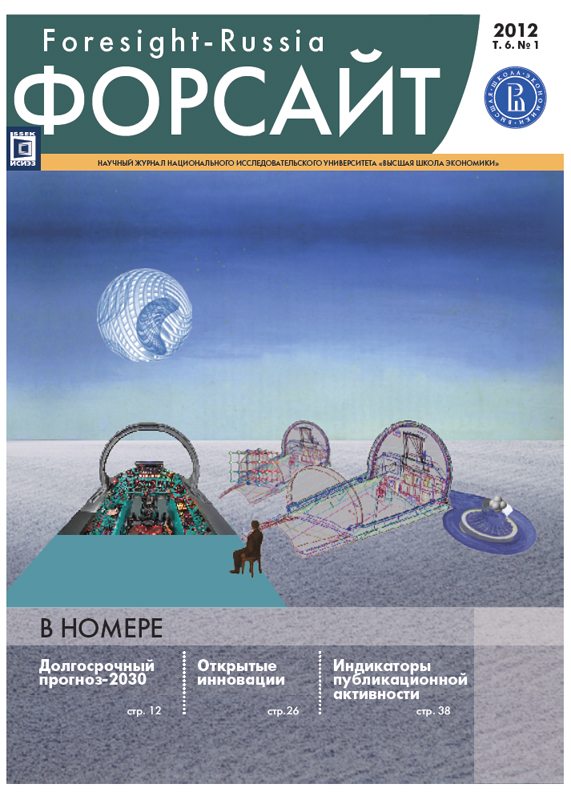Abstract
From 2007 to 2010, the EC funded a series of blue sky projects on foresight, including on new methodologies for horizon scanning in several European countries. The projects resulted in the evaluation of current methods for obtaining and processing scanning data and new conceptual thinking that may bridge the gap between scanning activities and policy-making. This paper provides an overview of conceptual thinking in two projects, SESTI and FAR Horizon. The key thinking is about emerging issues and about imaginative or potential wild cards, both considered to be potential storylines for future development or events that require policy action. Storylines come close to the concept of future narratives, as used in the policy discourse regarding aging in the Netherlands. The shows that narratives are used by policymakers when they fit a particular strategy, but that the narratives must compete with both present-day (experienced “past reality”) and future stories in policy discourse. The author describes strong “future” narratives and gives special attention those that include imaginative wild cards. The communicative strength of a future narrative (and the included issue) is decisive for its uptake in the discourse (in policy and business communities). However, this strength is only partly connected to its scientific or factual evidence base, since it may contain many elements that are not rational to make it strong.
The paper is concerned with what makes a «strong» narrative. Next to the authority of the messenger and the interests of the receiver, its psychological and emotional appeal to the audience and its historical context make it persuasive. Examples are given to show that future narratives are used to influence policy debates and decision making. Some have even succeeded in shaping the future to the interest of the author or for the benefit of society. The argument is that strong imaginative wild cards under the right conditions can have a powerful shaping effect, sometimes as shaping as that of real wild cards on the future.
References
Chilton P.A. (2004) Analyzing Political Discourse: Theory and Practice. London: Routledge.
Friedemann F. (2011) Pre-Earthquake Signals: Underlying Physical Processes // Journal of Asian Earth Sciences (in print).
Georghiou L., Cassingena Harper J., Miles I., Popper R. (2008) The Handbook of Technology Foresight: Concepts and Practice. Cheltenham: Edward Elgar.
Hiltunen E. (2008) Good Sources of Weak Signals: Global Study of Where Futurists Look for Weak Signals // Journal of Futures Studies. Vol. 12. № 4. Р. 21-42.
Loveridge D. (2009) Foresight: The Art and Science of Anticipating the Future. New York: Routledge.
Markley O. (2011) Staying Resilient in a Wild-Card World // Journal of the Institue of Noetic Science. № 6.
Morrison J.L. (1992) Environmental Scanning // Whitely M.A., Porter J.D., Fenske R.H. (eds.) A Primer for New Institutional Researchers. Tallahassee, Florida: The Association for Institutional Research. P. 86-99.
Perloff R.M. (2010) The Dynamics of Persuasion: Communication and Attitudes in the 21st Century (4th ed.). Taylor & Francis.
Petersen J.L., Steinmьller K. (2009) Wild Сards // The Millennium Project: Futures Research Methodology-V3.0.
Steinmuller K. (2004) The Future as Wild Card - a Short Introduction to a New Concept // Spatial Development Trends - Nordic Countries in a European Context. Nordregio. № 6. Stockholm.
Steinmuller K. (2007) Thinking Out of the Box. Weak Signals and Wild Cards for European Regions // Futura. № 2. Р. 22-29.
Taleb N.N. (2007) The Black Swan. The Impact of the Highly Improbable. New York: Random House.
Uskali T. (2005) Paying Attention to Weak Signals - The Key Concept for Innovation Journalism // Innovation Journalism. Vol. 2. № 11 (August).
van Dijk T.A. (2002) Political Discourse and Political Cognition // Chilton P.A., Schaffner C., Benjamins J. (eds.) Politics as Text and Talk: Analytic Approaches to Political Discourse. Philadelphia. P. 203-237.
van Lente H., Rip A. (1998) The Rise of Membrane Technology: From Rhetorics to Social Reality // Social Studies of Science. Vol. 28. № 2. Р. 221-254.
van Notten Ph.W.F., Sleegers A.M., van Asselt M.B.A. (2005) The Future Shocks: On Discontinuity and Scenario Development // Technological Forecasting and Social Change. № 72. Р. 175-194.
van Rij V. (2010a) Horizon Scanning: Monitoring Plausible and Desirable Futures // Veld R. (ed.) Knowledge Democracy. Springer Verlag. P. 227-240.
van Rij V. (2010b) Joint Horizon Scanning: Identifying Common Strategic Choices and Questions for Knowledge // Science and Public Policy. Vol. 37. № 1 (February). Р. 7-18.
van der Steen M. (2008) Ageing or Silvering? Political Debate about Ageing in the Netherlands // Science and Public Policy. Vol. 35. № 8 (October). Р. 575-583.

This work is licensed under a Creative Commons Attribution 4.0 International License.

